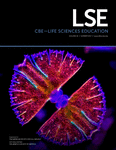A Problem-Sorting Task Detects Changes in Undergraduate Biological Expertise over a Single Semester
Abstract
Calls for undergraduate biology reform share similar goals: to produce people who can organize, use, connect, and communicate about biological knowledge. Achieving these goals requires students to gain disciplinary expertise. Experts organize, access, and apply disciplinary knowledge differently than novices, and expertise is measurable. By asking introductory biology students to sort biological problems, we investigated whether they changed how they organized and linked biological ideas over one semester of introductory biology. We administered the Biology Card Sorting Task to 751 students enrolled in their first or second introductory biology course focusing on either cellular–molecular or organismal–population topics, under structured or unstructured sorting conditions. Students used a combination of superficial, deep, and yet-uncharacterized ways of organizing and connecting biological knowledge. In some cases, this translated to more expert-like ways of organizing knowledge over a single semester, best predicted by whether students were enrolled in their first or second semester of biology and by the sorting condition completed. In addition to illuminating differences between novices and experts, our results show that card sorting is a robust way of detecting changes in novices’ biological expertise—even in heterogeneous populations of novice biology students over the time span of a single semester.



